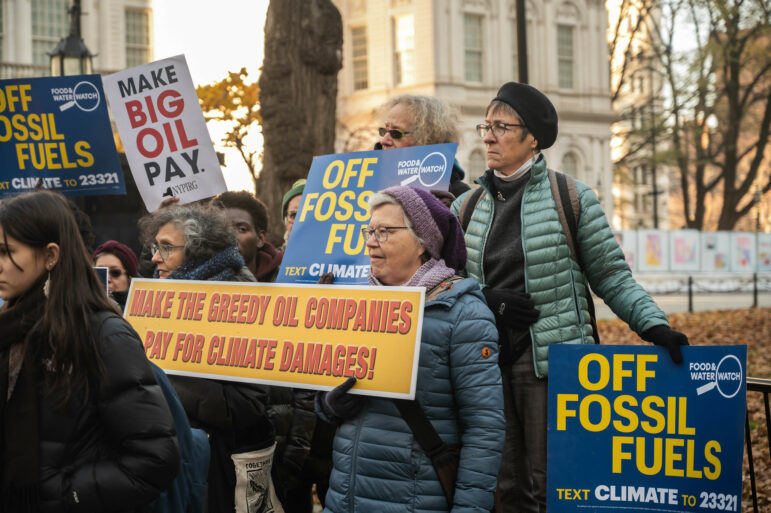
NY Assembly Could Stall ‘Polluters Pay’ Bill For Second Year in a Row
The Climate Change Superfund Act is in the spotlight now that a similar law passed in Vermont’s legislature, putting pressure on the Assembly to get New York’s version across the finish line before session ends in early June.
Ayman Siam/Office of NYC Comptroller
Climate activists with NYPIRG and Food & Watch Watch rallying for the bill with City Comptroller Brad Lander in December 2023.
The NY Heat Act isn’t the only big ticket climate bill that environmental groups are pushing lawmakers to pass before the legislative session comes to an end in early June.
The Climate Change Superfund Act is having its own moment in the spotlight now that a similar law passed both houses in Vermont‘s legislature, mounting the pressure on lawmakers to get New York’s version across the finish line.
The bill applies the “polluters pay” principle to climate change: if a company spills oil and pollutes a river, it’s required to pay for the clean up. The legislation proposes the same for those that wrecked the atmosphere and contributed to climate change.
The idea is to make the most prolific oil and gas producers that have business ties to New York pay $3 billion a year for the next 25 years for the total share of greenhouse gasses they emitted between 2000 and 2018. The funds, $75 billion in total, would be poured into infrastructure adaptation projects to protect the state from the effects of global warming.
But as is the case with the Heat Act, the fate of the Climate Change Superfund bill now hangs with the Assembly. The Senate passed the bill earlier this month, and while it’s making its way through the necessary committees within the Assembly—the Environmental Conservation Committee passed it on May 14—it’s yet to make it to the floor for a vote.
“The bottom line that I think assembly members need to consider is: whose side are they on? Are they on the side of New Yorkers or are they on the side of the fossil fuel industry?” said Eric Weltman, a senior organizer at Food & Water Watch who is advocating for the bill.
The fossil fuel industry’s trade association, the American Petroleum Institute, has been pushing back. In an email to City Limits, a spokesperson for the group said charging companies for polluting the atmosphere is “unnecessary” and will only “stall” progress in meeting the world’s energy needs as fossil fuels are still needed as society transitions to cleaner sources of energy.
Some opponents take the argument a step further by saying it will cause petroleum prices to rise, driving up costs for consumers and impacting local businesses.
But supporters dispute that assertion.
“It’s utter nonsense,” said the bill’s sponsor, Assemblymember Jeffery Dinowitz. “That’s the type of scare tactic that [the fossil fuel industry] typically uses when they try to stop good legislation because it may ever so slightly eat into their bottom line.”
“But the real bottom line is that they caused much of the damage of climate change, and they should have to pay for the harm of the cost of addressing it,” Dinowitz added.
Could the bill drive up the price of oil?
The American Petroleum Institute, a trade organization representing nearly 600 fossil fuel companies, registered to lobby the legislation and spent over $100,000 dollars last year pushing back against it and a series of other environmental bills.
“America’s natural gas and oil industry is working to address climate change and build a lower carbon future, while simultaneously meeting the world’s growing energy needs,” Scott Lauermann, a spokesperson for API, said in an email.
In a memorandum that API sent to New York state lawmakers and shared with City Limits, the association says the “bill is arguably discriminatory because it singles out certain companies.”
Jeanmarie Evelly
The document also claims “the bill places an unfair burden on domestic companies.” API says that if international companies can successfully argue in court that they have no business ties in New York, then local companies would be left to pick up the tab.
But the bill was designed to only impact the world’s largest oil producers as it covers companies whose total greenhouse gas emissions worldwide exceed 1 billion metric tons. Only major global oil companies like ExxonMobil, Chevron, Shell, and British Petroleum have that big of a carbon footprint and would be expected to pay up.
Still, the argument that local businesses will take a hit has resonated with the Business Council of Westchester, which recently penned an op-ed against the bill.
“Once these large corporations start footing the bill they are going to have to raise their rates. So that means that all of a sudden businesses in New York and consumers in the state are going to have higher energy rates because of this type of legislation,” said John Ravitz, vice-president and chief operating officer at the Council.
But a study by the Institute for Policy Integrity at NYU says the idea that oil companies could pass on increases in fixed costs to consumers is “unlikely.”
“It is an international market and the price is not set in the United States, let alone New York State,” said the economist Peter Howard, director at the institute and co-author of the study.
“If these companies started trying to manipulate prices, the market would respond and other firms would enter the market. So there’s really no ability for these companies to manipulate prices,” Howard added.
The bill, Howard also points out, would charge companies different amounts according to how much carbon they emit. A scientific peer-reviewed method devised by the Climate Accountability Institute will be used to estimate how many metric tons of greenhouse gasses from each fuel company ended up in the atmosphere on an annual basis.
So if one company raises its prices to compensate for losses incurred from paying into the superfund, competitors on the market will actually benefit from keeping their prices low to attract customers. That’s just how capitalism works, he explained.
Howard does point out, however, that if every state were to follow in New York’s footsteps and start charging oil companies for pollution, it could potentially dent individual company profits. But the economist says it’s “far-fetched” to assume every U.S state will pass a similar law, and notes that the industry is doing better than ever.
In 2022, the U.S fossil industry amassed record earnings. Last year it was reported that profits for companies like Exxon Mobil and Chevron remained the strongest in recent history.
The damage climate change has caused to local businesses, some say, far outweighs the damage the bill could bring to oil industry profits.
“Unless you are in the fossil fuel industry, your business model is not supported by a climate that is rapidly becoming less and less stable, where year after year states are seeing numbers in the billions in terms of the load on taxpayers from climate disasters,” said Kate Ogden, head of advocacy at the eco-friendly product company, Seventh Generation.
Seventh Generation is part of New York Businesses for Climate Justice, a coalition of companies that fight for environmental legislation.
“It’s about recognizing that these businesses knew they were driving climate change, they had data on this and kept it to themselves,” said Bob Rossi, executive director of the New York Sustainable Business Council, another member of the coalition.
An investigation published nearly a decade ago uncovered internal company memos that revealed oil giant Exxon was aware of climate change and its role in driving it, as early as 1977.
“It’s the same thing that happened to the tobacco industry: they knew what was happening and they were lying to the public, that’s what we’re talking about,” Rossi added.
Marc A. Hermann / MTA
Flooded roads in Gowanus, Brooklyn on Sept. 29, 2023. The money collected by the Climate Change Superfund would be poured into infrastructure adaptation projects to protect the state from the effects of global warming.
What now?
Earlier this year, both the Senate and the Assembly signaled support for the Climate Change Superfund Act in their budget resolutions, although the Assembly did not name the bill directly.
“The Assembly is supportive of holding fossil fuel polluters accountable for costs related to climate change via a cost-recovery method; however, any such approach cannot impact consumers who are already overburdened by adverse price increases,” the chamber’s recommendation reads.
The governor did not include any mention of it in her own budget proposal, which left advocates wondering if that’s part of the reason the legislation has stalled.
“Governor Hochul will review all legislation that passes both houses of the legislature,” a spokesperson said in an email.
But the Superfund Act can’t make it onto her desk to be signed into law unless it gets the stamp of approval from the Assembly first.
Last year, it didn’t pass the chamber. But advocates believe it has more of a shot this year, noting that the bill has 76 co-sponsors out of 150 in the Assembly and that unlike last year, it passed the Assembly’s Environmental Committee this time around.
“The ball really is in the speaker of the Assembly’s court to put it up for a vote because clearly the supporters are there. If the leadership wants to move it, it will move fast,” said Blair Horner, executive director of the New York Public Interest Group and an advocate for the bill.
Assembly Speaker Carl Heastie did not immediately respond to a request for comment, nor did Assemblymember Helene Weinstein, who chairs the Ways and Means Committee where the bill currently sits.
Advocates fear that two of their big climate priorities for this year, the NY Heat Act and the Climate Change Superfund, will meet a similar demise.
“I think it’s politically stupid. It’s certainly to the detriment of New York’s future, if the Assembly were to block two of the top priorities that we have this session,” said Weltman from Food & Water Watch.
“It sounds like a political miscalculation to potentially block progress on the greatest threat facing New York and the nation: climate change.”
To reach the reporter behind this story, contact Mariana@citylimits.org. To reach the editor, contact Jeanmarie@citylimits.org
Want to republish this story? Find City Limits’ reprint policy here.
The post NY Assembly Could Stall ‘Polluters Pay’ Bill For Second Year in a Row appeared first on City Limits.


